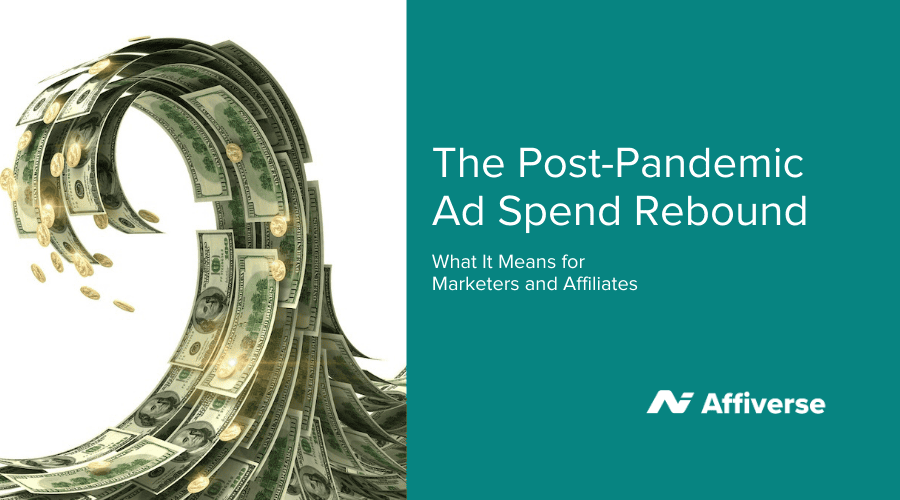The Post-Pandemic Ad Spend Rebound: What It Means for Marketers and Affiliates

The digital advertising landscape, much like the broader economy, experienced a significant shake-up during the COVID-19 pandemic.
As businesses grappled with the economic uncertainties, many slashed their marketing budgets, leading to a noticeable dip in ad spend across various digital channels. However, as the world gradually emerges from the pandemic, a remarkable recovery in ad spend is underway, signalling not only a return to normalcy but also an evolution in how businesses approach online marketing.
This blog post explores the dynamics behind this rebound, why it’s critical for marketers, and the specific implications for affiliate marketers.
The Pandemic’s Impact on Ad Spend
The onset of the COVID-19 pandemic in early 2020 led to an immediate and widespread reduction in advertising budgets. Companies faced with declining revenues and an uncertain future had little choice but to cut back on marketing expenses.
Travel, retail, and hospitality sectors were among the hardest hit, leading to a noticeable decrease in digital ad spend.
However, not all sectors were equally affected. The pandemic accelerated the shift towards e-commerce, remote work, and digital services, prompting an increase in digital ad spend within certain industries, particularly tech and online retail. Yet, overall, the landscape was one of caution and reduced investment.
The Rebound: A New Era of Digital Advertising
As the global economy began to stabilise and recover, so too did confidence in digital advertising. The ad spend rebound we are witnessing now is driven by several factors:
- Shift to Digital Channels: The pandemic has irrevocably altered consumer behaviour. More people than ever are shopping online, consuming digital content, and engaging with brands via social media. This has prompted businesses to allocate a larger portion of their budgets to digital channels to meet customers where they are.
- Performance-Driven Marketing: Companies are increasingly focused on performance-driven marketing strategies, where every pound spent is closely monitored for its return on investment (ROI). Digital channels, with their precise targeting and measurable outcomes, are particularly well-suited for this approach.
- Innovation in Ad Formats: The rapid development of new ad formats, such as shoppable ads, video ads on social platforms like TikTok and Instagram, and advanced targeting options, has also spurred increased investment. Brands are keen to experiment with these new tools to engage audiences in fresh and impactful ways.
- Pent-Up Demand: The post-pandemic period has seen a release of pent-up demand as consumers are eager to return to normalcy, albeit with new digital habits. This surge in consumer activity has encouraged brands to ramp up their advertising efforts to capture this newfound demand.
Why This Matters for Affiliate Marketers
The resurgence in ad spend is not just a boon for big brands and media companies; it holds particular significance for affiliate marketers as well.
- Increased Budgets Mean More Opportunities: As businesses increase their advertising budgets, they are likely to expand their affiliate programmes to drive performance-based outcomes. This means more opportunities for affiliates to partner with brands across various sectors.
- Focus on ROI: With companies placing a stronger emphasis on ROI, affiliates who can deliver measurable results will find themselves in high demand. This is an ideal time for affiliates to fine-tune their strategies, focusing on high-conversion content and leveraging data-driven insights to optimise their campaigns.
- Innovation in Affiliate Marketing: The innovation seen in ad formats extends to affiliate marketing as well. For instance, the rise of influencer marketing and social commerce has blurred the lines between traditional affiliate marketing and content creation. Affiliates who can adapt to these new formats and integrate them into their strategies will be well-positioned to capitalise on the ad spend rebound.
- Shifts in Consumer Behaviour: The pandemic has changed how consumers interact with brands, making personalisation and relevance more important than ever. Affiliates who can provide tailored content and offers that resonate with the post-pandemic consumer will see greater success in their campaigns.
The recovery of ad spend post-pandemic is a clear indicator that businesses are regaining confidence in the market and are eager to invest in digital marketing once again. For marketers, this rebound represents a chance to leverage new opportunities, explore innovative ad formats, and engage with consumers in meaningful ways.
For affiliate marketers, the current landscape offers an abundance of opportunities to grow and thrive. By focusing on performance, embracing new marketing formats, and understanding the shifting consumer landscape, affiliates can position themselves at the forefront of this exciting new era in digital advertising.
As we continue to navigate the post-pandemic world, one thing is certain: digital advertising is more crucial than ever, and those who adapt to these changes will be the ones who reap the rewards.






